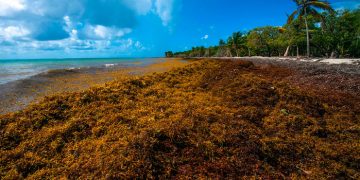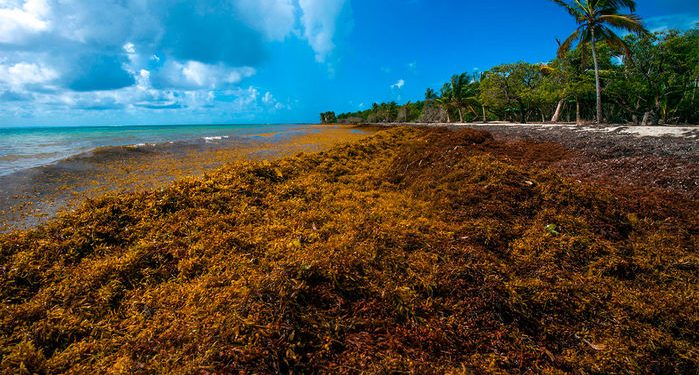COLE BAY – The Sint Maarten Nature Foundation has issued recommendations pertaining to the proper cleaning and disposal of Sargassum seaweed from along the nation’s beaches. There is a large influx of Sargassum seaweed currently making landfall on Sint Maarten. The Foundation has been coordinating monitoring efforts with partners in the region and based on weather predictions, satellite imagery and field surveys large mats of Sargassum will be impacting area for some time.
“With the current predictions it appears as if we are in a long-term Sargassum impact phase here in the North Eastern Caribbean,” commented Nature Foundation Manager Tadzio Bervoets. “As such we would like to make recommendations on how to effectively remove Sargassum in terms of maintaining the beaches while simultaneously facilitating adequate cleanup,” continued Bervoets.
The Nature Foundation recommends that removal of Sargassum should be carried out manually without the use of heavy equipment and/or machinery;
After the Sargassum has been raked the left-over sand should be deposited back on the beach;
The collected Sargassum should be deposited at a designated location on the beaches which have been raked;
If practical the left-over Sargassum can be buried at a suitable location keeping in mind the safety and conservation of sea turtle nesting habitat.
“We have been working closely with our partners in the region and with local stakeholders in monitoring the situation and to find a way to control the amount of the weed washing up on beaches in the case of a significant influx. In the case of an influx we need to find a way to coordinate the removal of the seaweed in order to avoid serious risks to nesting sea turtles and hatchlings while the algae itself can be a hazard to the animals,” continued Bervoets.
Sargassum is a genus of brown (class Phaeophyceae) seaweed which is distributed throughout the temperate and tropical oceans of the world. Sargassum first plagued St. Maarten in 2011 and 2012, with the Foundation having to warn swimmers to avoid swimming on certain beaches due to the large amount of Sargassum Weed and many beach front residences and hotels having to continuously clean washed up Sargassum.


















